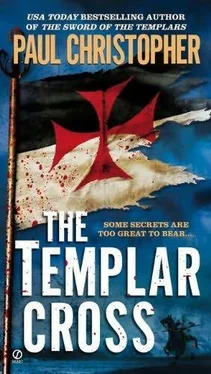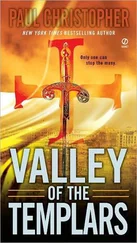Paul Christopher - The Templar Cross
Здесь есть возможность читать онлайн «Paul Christopher - The Templar Cross» весь текст электронной книги совершенно бесплатно (целиком полную версию без сокращений). В некоторых случаях можно слушать аудио, скачать через торрент в формате fb2 и присутствует краткое содержание. Жанр: Триллер, на английском языке. Описание произведения, (предисловие) а так же отзывы посетителей доступны на портале библиотеки ЛибКат.
- Название:The Templar Cross
- Автор:
- Жанр:
- Год:неизвестен
- ISBN:нет данных
- Рейтинг книги:5 / 5. Голосов: 1
-
Избранное:Добавить в избранное
- Отзывы:
-
Ваша оценка:
- 100
- 1
- 2
- 3
- 4
- 5
The Templar Cross: краткое содержание, описание и аннотация
Предлагаем к чтению аннотацию, описание, краткое содержание или предисловие (зависит от того, что написал сам автор книги «The Templar Cross»). Если вы не нашли необходимую информацию о книге — напишите в комментариях, мы постараемся отыскать её.
The Templar Cross — читать онлайн бесплатно полную книгу (весь текст) целиком
Ниже представлен текст книги, разбитый по страницам. Система сохранения места последней прочитанной страницы, позволяет с удобством читать онлайн бесплатно книгу «The Templar Cross», без необходимости каждый раз заново искать на чём Вы остановились. Поставьте закладку, и сможете в любой момент перейти на страницу, на которой закончили чтение.
Интервал:
Закладка:
"And that fits, too," said Rafi. "Hudal was a bishop with connections and insiders both in the SS and at the Vatican."
Holliday sat back in his seat.
"Now I see," he said. "The monk from Biblical Archaeology School in Jerusalem, this Brother Brasseur or whatever his name is, he wasn't searching for Templar texts in the Archives; he was trying to find Hudal's records. They were looking for the SS gold right from the beginning."
They arrived in Mersa Matruh at six thirty in the morning. It was a city of two hundred thousand or so, a miniature Alexandria, the sea masked by a line of hotels and resorts along the Corniche, all new and all modern, with the old city of its real Berber inhabitants behind the high-rise facade, selling the produce grown on the little desert farms they'd seen from the train. They booked into the Beausite, a moderately priced five-story hotel with its own sand beach. A single phone call to the concierge presented them with an insurmountable problem. They took their complimentary continental breakfast out onto the balcony of their narrow room to discuss the situation.
"We're screwed," said Rafi abjectly, looking out over the ultramarine ocean in front of the hotel. He tore off a corner of his croissant and buttered it. "It'll take you weeks to get a visa for Libya with an American passport and I probably couldn't get one at all."
"So then we do it without visas," said Holliday, sipping his strong coffee.
"How do we manage that?" Rafi asked.
"Look on the map," said Holliday. "The closest place on the Egyptian side is Siwa Oasis. That's only a couple of hundred miles from here. Siwa is less than fifty miles from Jaghbub."
"Across an impenetrable border," grunted Rafi. "They've got something like two million land mines planted. Fences, cameras, the whole deal. Egypt and Libya were at war back in the seventies."
"That's LRDG territory," said Holliday. "I guarantee it's like a sieve."
"LRDG?"
"Long Range Desert Group," explained Holliday. "The Brits and the Germans chased each other back and forth across the border for years. There has to be dozens of caravan trails through there."
"Not any that I know about," said Rafi.
"Then we'll find someone who does," answered Holliday. "I'm not about to give up on Peggy now."
Later that day they purchased a high-wheeled military surplus Czech-made UAZ-469 tin-can jeep from a defunct safari tour company. They spent the afternoon stocking the knockoff, tin-roofed Land Cruiser with supplies, including as many maps of the area as they could find. The following morning they left for Siwa Oasis, traveling due south through the desert. The bare-bones vehicle drove like a tank and had virtually no suspension but the simple Peugeot-Citroen diesel engine ticked over nicely, and even though the dashboard and its instruments were primitively built, everything seemed to work well enough. The top end of the speedometer read 120 kph, but the reality was more like 90, or about fifty-five miles an hour.
"I wonder what 'pri vjezdu voziola do terenu zapni predni nahon' means," said Rafi, reading a riveted notice on the dashboard behind the plain, three-spoked wheel of the truck. "Sounds a little ominous."
"Let's hope we never find out," said Holliday, sitting forward, trying to peel his perspiration-soaked shirt away from the sticky vinyl seats. No wonder the safari tour company had gone under. He tried to imagine some cheesesteak-overweight tourist from Winnetka enduring a sweltering day in the un-air-conditioned Soviet truck. It wasn't pretty.
They drove for five hours, switching drivers every fifty miles and stopping only four times, once to eat their prepared lunches, twice for bathroom duties at one of three government rest stops and once to fill the gas tank from the jerry cans of diesel fuel lined up in the cargo area of the truck. Other than dunes the only changes in the landscape were occasional radio transmission towers, half a dozen roadside oil rigs, a few sand drifts across the two-lane blacktop and the remains of an ancient fort. Here and there they saw signs in Arabic and English telling them they were either entering or leaving a military zone. There wasn't a single gas station, hotel, motel or refreshment stand to be seen.
"There was a sixth-century B.C. king of Persia named Cambyses who once sent an army here," said Rafi, looking out at the bleak, monotonous landscape. "They were on a mission to destroy the Oracle at Siwa."
"What happened?" Holliday asked.
"There was a sandstorm. The whole army vanished, all fifty thousand of them. They were never seen again."
Finally after more than a hundred and sixty miles the landscape began to change, dunes becoming hills, hills becoming stony, stunted mountains, palms and patches of green beginning to appear. Abruptly the lands fell away and a palm-filled depression appeared, saltwater lakes twinkling in the brilliant sun, fields of alfalfa bending in the desert wind. Siwa lay below them.
Siwa is not the oasis most people visualize from the movies. Instead of a single pool of water surrounded by a grove of palm trees, Siwa is a fifty-mile-long depression, twenty miles across, once the bed of a fast- flowing mountain river, perhaps even the Egyptian version of the Grand Canyon. In this long, relatively narrow depression there are large groves of date palm, olive groves, wheat fields, saltwater lakes and freshwater streams and springs that turn the desert into a blossoming verdant sanctuary.
The oasis at Siwa is known to have been occupied by man for at least ten thousand years. When Alexander the Great came to Siwa to consult the oracle of Amon Ra the town was already dominated by the enormous clay and mud fortress known as the Shali, a complex construction of fortified buildings as much as five stories tall built up the slopes of an artificial mountain. The huge fort lasted for thousands of years until the 1920s, when three days of successive torrential rains "melted" the mud-brick structure like a child's sand castle ruined by the encroaching tide. Even now the Shali is an impressive creation and still looms over the town.
The town of Siwa contains about ten thousand inhabitants, mostly involved with the marketing and sale of Siwa grapes and olives as well as tourism. Most of the townspeople as well as the farmers and grove owners are ethnic Berbers. There are half a dozen small hotels in Siwa and Holliday and Rafi chose what appeared to be the best of them, the Safari Paradise, a lodge surrounded by a cluster of individual bungalows and all facing a bubbling springwater pool. After booking into one of the little cottages, they freshened up, then headed for the main dining room in the lodge.
The dining room of the Safari Paradise was surprisingly elegant considering that it was located in a place that, along with Timbuktu, may well have inspired the phrase "the middle of nowhere." The white plaster walls were hung with colonial oils of Egypt and Siwa in particular, and the ceiling was crisscrossed with coffered wooden beams. The tables were covered with white linen, starched napkins fanned elaborately at each sterling silver place setting. The maitre d', whose name was Omar, wore evening clothes. There was a variety of entrees on the enormous tasseled menu, from New York strip loin and prime rib to chicken kishk and kofta kebabs. Appetizers ranged from French fries or zucchini strips to pita and baba ghanouj with zabadi-mint yogurt dip and wara'enab-stuffed grape leaves. They ordered from a pleasant waiter who spoke perfect English. Holliday, being the more adventurous eater, chose the chicken kishk and the stuffed grape leaf appetizer. Rafi ordered a cheeseburger and fries. They both ordered tea.
They were just finishing up their meal and thinking about coffee when a man materialized at their table. He was tall, broad-chested and wearing long shorts and an old-fashioned fatigue jacket with a collarless white shirt beneath it. His face was square with a full gray beard, shaggy gray hair down to his shoulders and heavy dark eyebrows over large, intelligent, pitch-black eyes. The nose was long and aquiline and would have suited a Caesar. His skin was dark as iced tea. When he spoke he showed a line of small white teeth, bright against the dark tan. He had the rich baritone voice of an actor or a politician. The accent was not quite British, Mid-Atlantic. Canadian maybe, thought Holliday, but he wasn't absolutely sure.
Читать дальшеИнтервал:
Закладка:
Похожие книги на «The Templar Cross»
Представляем Вашему вниманию похожие книги на «The Templar Cross» списком для выбора. Мы отобрали схожую по названию и смыслу литературу в надежде предоставить читателям больше вариантов отыскать новые, интересные, ещё непрочитанные произведения.
Обсуждение, отзывы о книге «The Templar Cross» и просто собственные мнения читателей. Оставьте ваши комментарии, напишите, что Вы думаете о произведении, его смысле или главных героях. Укажите что конкретно понравилось, а что нет, и почему Вы так считаете.











